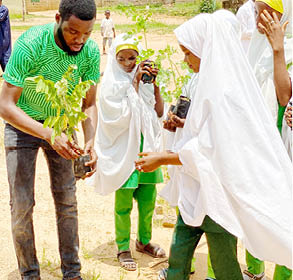In the face of rapid desertification in Northern Nigeria and the growing threat of climate change globally, a Kano State-based NGO, Panacea Foundation, has taken up the challenge of greening the environment.
Tree planting was a well-known culture among Kano residents, but that culture gradually died down, thereby depriving the ancient city of a sustainable green ambience and exposing residents to the vagaries of climate change.
- Anambra communities in panic harvest over flood menace
- Man arrested for killing neighbour to evade repaying loan
This is to the extent that even the few trees left in the urban areas are being cut down on a daily basis to pave way for the new buildings and roads springing up.
However, Panacea Foundation is working to encourage tree planting and creating awareness on climate change in Kano. It recently organised a sensitisation for the metropolitan LGAs, where stakeholders and academics trained the public on the dangers and effects of tree felling.
The founder of Panacea, Dr Dahiru Muhammad Hashim, said over the years, trees were planted, but that to manage them to grow had become a major challenge, hence the need for the interventions.
He said, “We have taken a different modality by trying to coordinate our activities so that we can try to manage these trees from the comfort of our homes which are under our monitoring and evaluation team.”
An associate professor of urban and regional planning, Bayero University Kano (BUK), Aliyu Barau, said climate change was one of the gravest challenges confronting human kind in the 21st Century as it affected every system, including the whole life circle.
He said although solutions were already proposed globally, “For states like Kano and Nigeria at large, reducing the emission level is key. And part of the solutions is reducing the use of charcoal and firewood and planting trees.”
According to environmental experts, a tree planted in urban centres can absorb up to 150kg of Carbon (IV) Oxides (CO2) per year, sequester carbon which consequently mitigates climate change.
Similarly, the United Nations (UN) says a single tree can consume 9,000 litres of water, and as such trees play a significant role in preventing flooding. It also said that a single tree planted in the urban area had cooling effect equivalent to 10 room Air Conditioners (AC), explaining that the strategic placement of trees in urban areas could cool the air by between 2°C and 8°C, and that large urban trees were excellent filters for urban pollutants and fine particulates.
However, even as trees in urban areas are being felled without adequate replacement, trees in the rural areas are being felled at an alarming rate because of the increasing need for firewood and charcoal, two substances that add to the ravaging climate change.
Also, a lecturer of environmental management at BUK, Ummi Khaltum Muhammad, said tree felling had ravaged Kano City and led to excessive heat because the carbon sink was destroyed.
Faced with the effect of this challenge, the Kano State Government had in the past two years commissioned the planting of two million trees across some parts of the city.
Although the locations of these planted trees could not be traced, the Commissioner for Environment, Dr Kabiru Ibrahim Getso, insisted the trees were planted on major streets, tertiary institutions, government agencies and other places across the city.
He also said preparations were in place to plant an additional one million trees this year.
Apart from the state government, several other groups and individuals have embarked on various projects to plant trees in the city, but the efforts seem to have been inadequate.
Another environmental management lecturer at BUK, Dr Halima Abdulkadir Idris, said apart from felling trees, the disappearance of forests and emergence of informal settlements in the state had contributed to the rising challenges associated with climate change.
She said part of the solution to the challenge was creating green gardens in the city and also ensuring that new settlements were designed to include spaces for tree planting and other mitigating factors to climate change, calling on all authorities involved to play parts in adopting the measures.
She further said, “Before, we had small urban forests in Kano City. But they are nowhere to be found today. These places served a significant role in averting the dangers of climate change in the city.
“So, these green parks have to be restored and the new settlements and buildings in the city should be designed to include trees in order to be safe from these challenges. So the government has a key role to play.”

 Join Daily Trust WhatsApp Community For Quick Access To News and Happenings Around You.
Join Daily Trust WhatsApp Community For Quick Access To News and Happenings Around You.


